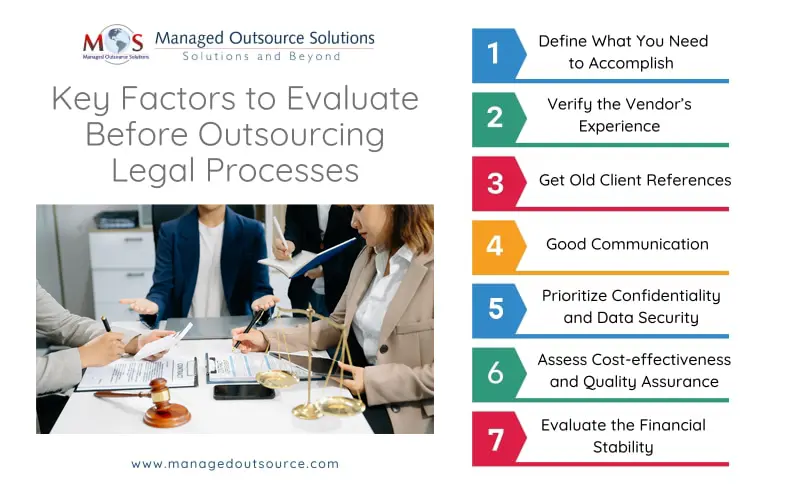Delegation of functions is a common practice in busy legal offices. Legal process outsourcing arose from the need to have specialists handling non-core tasks which the busy attorney just did not have time to do. Today, this trend is seen as a means to cut costs, save time, and stay competitive. Common litigation support outsourcing processes outsourced by legal professionals include document processing activities such as transcription, litigation coding, document conversion, trial preparation, legal and litigation support services, legal research and drafting, and intellectual property rights enforcement and registrations. Firms increasingly rely on outsourced legal work to streamline operations without compromising on quality.
7 Considerations When Outsourcing Legal Processes
- Define What You Need to Accomplish through Legal Process Outsourcing: Before outsourcing, it’s vital to identify the specific tasks or processes you want to delegate. Clearly define the desired outcomes beyond just completing the tasks. LPO can provide various benefits, such as reducing supervision time, enabling you to focus on core competencies, adding expert capabilities, enhancing workflow efficiency, and reducing operational costs. By understanding the end goals, you can set clear expectations and measure the success of the outsourcing partnership effectively. One of the key benefits of legal process outsourcing for law firms is the ability to scale operations without expanding internal teams.
- Verify the Vendor’s Experience: The experience of the LPO provider is crucial to make sure that they can handle the complexities of your legal requirements. Verify whether the vendor has prior experience delivering services similar to the ones you plan to outsource. For large or long-term contracts, interacting with the proposed team members can help you assess their expertise and suitability for the project. This step ensures the team has the necessary skills and knowledge to execute the tasks efficiently and meet your expectations.
- Get Old Client References: Requesting references from previous clients is an excellent way to evaluate an LPO provider’s quality of service. Speak with their past clients to understand the vendor’s performance in areas such as timely delivery, client engagement, and support. You can also ask for work samples or prototypes, if available, to gauge their capability. Keep in mind that actual deliverables may not always be shared due to confidentiality agreements, so be open to reviewing sample materials made for marketing purposes.
- Good Communication is Crucial: Effective communication is essential for successful outsourcing partnerships. Establishing clear communication practices with the LPO provider ensures that both parties are aligned throughout the project. Check if the vendor operates in a compatible time zone or has overlapping work hours to facilitate real-time communication. Ensure they use standard communication channels like email, phone, or video conferencing platforms such as Skype. Additionally, verify that both parties share a common language to prevent misunderstandings and maintain smooth collaboration.
- Prioritize Confidentiality and Data Security: Confidentiality and data security are critical in the legal field. Legal documents management involves handling sensitive client information, so it is imperative to assess the vendor’s data protection practices. Evaluate their security measures, such as encryption, access controls, and compliance with relevant regulations, to ensure client data is safeguarded. Make sure that the provider of legal process outsourcing services adheres to confidentiality agreements and has robust policies to mitigate risks associated with data breaches or leaks.
- Assess Cost-effectiveness and Quality Assurance: Cost savings are a significant factor in legal outsourcing, but they should not come at the expense of quality. Understand the vendor’s pricing structure, including any hidden costs or variations that may arise due to project scope changes. Establish clear service-level agreements (SLAs) and performance metrics to maintain consistent quality. Quality assurance mechanisms, such as regular audits and feedback loops, are essential to ensure the LPO provider meets your standards and delivers excellent results. If you’re seeking cost-effective legal support through outsourcing, this step is key to balancing quality and affordability.
- Evaluate the Financial Stability of the LPO Provider: The financial stability of the LPO provider is especially important for large-scale or long-term contracts. A financially stable vendor is more likely to have sufficient resources, workforce, and working capital to handle your requirements effectively. Assess their financial health by reviewing financial statements, growth history, or other relevant indicators to ensure they can sustain operations throughout the duration of your partnership.
The American Bar Association (ABA) has outlined strategic considerations for outsourcing legal and non-legal support services. These include asking about measures in place to ensure security of client information such as their computer network and refuse disposal systems; enquiring into their hiring practices so as to ascertain the character of staff who are likely to have access to client files; and assessing the educational background of the lawyers or non-lawyers involved. Among other things, the ABA also recommends that the client should oversee the project adequately and appropriately.
Legal Process Outsourcing can offer numerous benefits, but only if approached with careful consideration. By defining your goals, verifying the provider’s experience, prioritizing confidentiality, and establishing clear communication, you can set the foundation for a successful outsourcing partnership.





